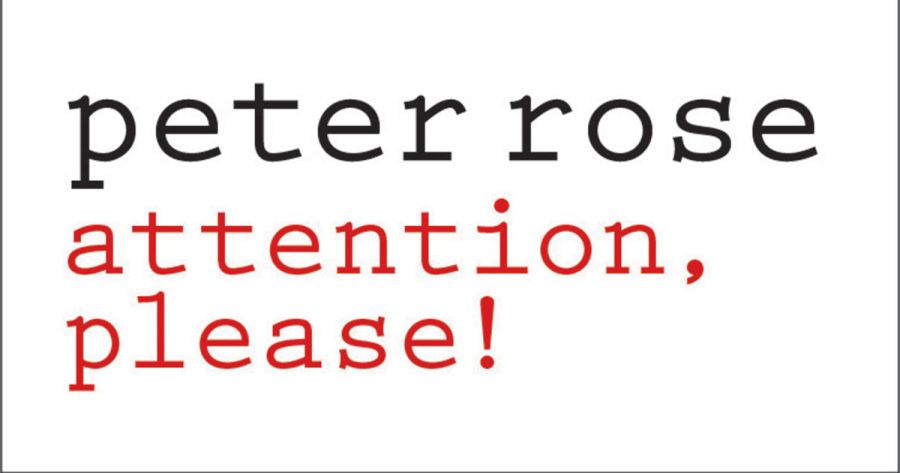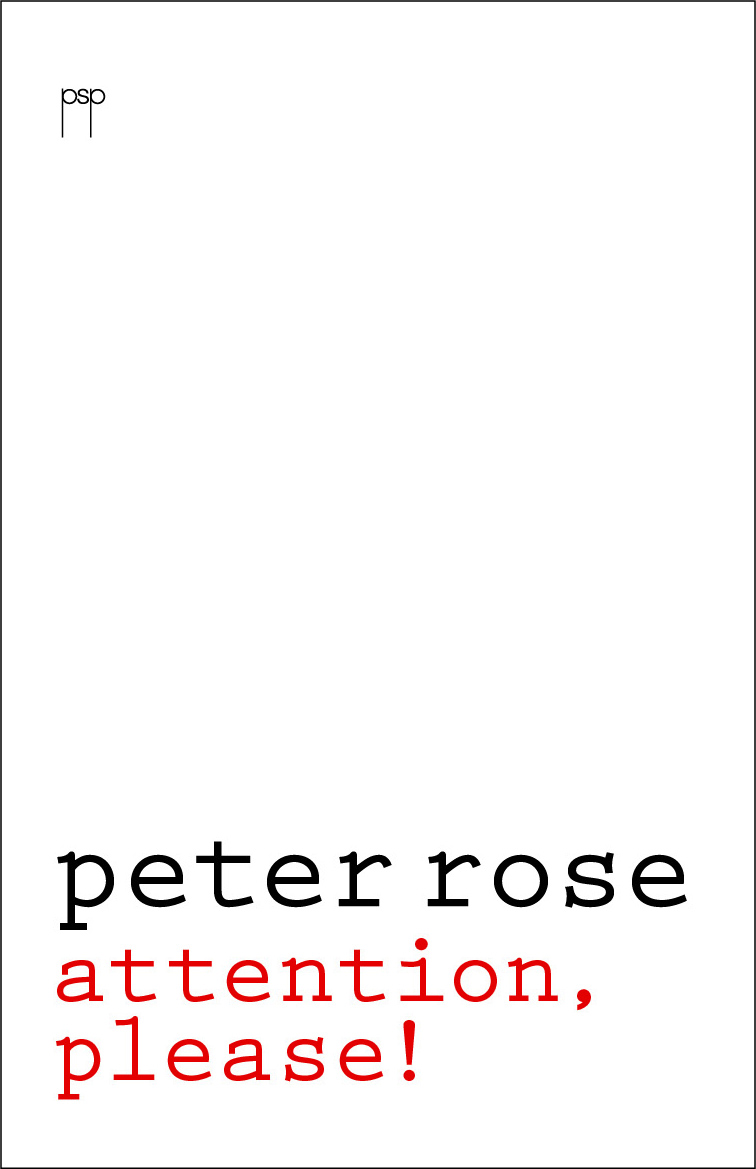
- Free Article: No
- Contents Category: Poetry
- Review Article: Yes
- Article Title: All one can do
- Article Subtitle: Poetry as the salted wen
- Online Only: No
- Custom Highlight Text:
Peter Rose, the editor, for just under a quarter of a century, of these pages, has put down his scissors and pot of glue to turn seventy (in June) and step back into civilian life. Coincidentally or not, he has also just put out another book of poems, Attention, Please!, his first since The Subject of Feeling in 2015. The new title – a softened imperative – speaks aptly and cannily for the contents.
- Book 1 Title: Attention, Please!
- Book 1 Biblio: Pitt Street Poetry, $28 pb, 79 pp
- Book 1 Cover Small (400 x 600):

- Book 1 Cover (800 x 1200):

- Book 1 Readings Link: https://www.readings.com.au/product/9781922776181/attention-please--peter-rose--9781922776181#rac:jokjjzr6ly9m
It is always tempting for a delicate and soft-mannered poet to do something in a broad and catchy vein. Something to get the handclaps going, to make the crowd raise their cigarette lighters, or their smartphones. Here, there are twenty-four new instalments to Rose’s popular series, ‘The Catullan Rag’, a series that he seems to have been writing forever. ‘A few poems are loosely based on the originals,’ Rose remarks in a note,‘most are not.’ His blend of Latinate idiom and twenty-first-century sniping ultimately takes its origins from Ezra Pound’s ‘Homage to Sextus Propertius’. Some of the anachronisms are as brilliant as Pound’s ‘frigidaire patent’. A poet composing wafty letters in order to have something to tout to UT Austin, wants them for ‘that temple in Texas’. The Catullus poems are, to use another Pound title, ‘Moeurs Contemporains’. Greed, lust, decay are the frequentist themes. There are aspersions on foundered or evilly flourishing literary careers, on lapses of style (chinos, bad television), on ageing disgracefully. There are monuments to metrosexual appetites, to fits of lust or rue. Proper names (Socration, Postumia, Sufficio) are fair game, so that I suspected ‘Portfolio’ or ‘Abacus’ of being adversaries instead of merely titles and props. Here is the whole of ‘Spectacles’:
Like a melodrama running in the provinces
to shrinking audiences,
Fufidius is so ancient
that when he totters off to piss
he takes his spectacles,
so misty his aim, so wizened the vessel.
It is the badly wearing ‘Fufidius’ (the name utterly preposterous but authentic) that first catches the eye and ear (it sounds like a stammered effort to get out the barely manly Fifi or frou-frou), followed, in quick succession, by ‘misty’ and ‘wizened’ and, retroactively, ‘shrinking’. The poem is a suspension of droplets, a shower of messy half-rhymes, a melodrama. It runs and runs.
While one or two of Rose’s ‘own’ poems have comparable attack – say, the feisty anti-monarchist rant ‘Coronation Chicken’ – in most of them the lights and sound are turned down way low. Moments seem to emerge obliquely from a chiaroscuro of time, picked out for little or no reason and accordingly all the more miraculous as acts of retrieval. A contemporary at school, early deceased and not thought about for decades (‘Come, Memory’); a walk during the Covid-19 lockdown (‘The Circuiteers’); a scene witnessed on a bus or tram (‘Honey’, ‘Snail Shells’); memories of bookshops and butchers’ shops in a tenderly recollected proto-cosmopolitan Melbourne (‘Death Masks’, ‘The Unaccommodated Tongue’). Of necessity, books are a big part of this poetry, reading at night, associatively, crosswise, in a sort of domino way (‘Styptic’). Thinking up some remarks for an event on John Ashbery (‘Ancient Breezes’): ‘All I can think to say, / Episcopalian hand on heart, / is that reading him is like being at a cleverer party / than you really deserve, bailed up on a patio / by someone much drunker than you, / saying the most astonishing things.’ (I love being taught words and usages by poems and looked up ‘bailed’.)
The ticking heart of the book is something spectral, a compound life-experience of insomnia (‘pondering the etiquette of commissioning / in the middle of the night’) and discretion (‘Stealthy, I fill my Bialetti and wonder / if I’m waking everyone in the house’); of moving house too many times; of losses of parents and friends and lovers; of sequences of streets and books committed to memory, forgotten and re-remembered when they no longer matter. Rilke said poetry wasn’t a matter of feelings or memories: you had to forget things before they had a chance of becoming poems. ‘Digits’ (‘Now when I ring the old house’) and ‘Contrary Winds’ are two fabulous, exemplary elegies to the telephone voice and presence of Rose’s mother, who died in 2022. Both conjure the isolation of memory in an impervious or unaware setting. ‘A brusque woman / in America eventually answers’, it says in the one; ‘two plump women / in yellow vests learn boxing from a hunk’ in the other. Emblems, both, of callousness or uninvolvement. ‘Cartographer’ is an elusive, fascinating piece that seems to marry a dancing woman, glass in hand, with a red wine stain and salt, the traditional remedy sprinkled over it. ‘It’s still there,’ the poem says, ‘the wen / beneath the pyrrhic salt.’ Pyrrhic, one thinks, styptic. The effort to quench or stifle or still, and everywhere the stain – the loss – surviving all the attempts to erase it, to adjust to it, to survive it.
There is a kind of poem – real poem, too, proper poem, not a charitable euphemism – written as a sideline by a busy man or woman, a professor, a statesman, an ambassador, a novelist, someone in business; that is what these latest poems of Peter Rose’s put me in mind of. (Recent British equivalents would include Ian Hamilton or Grey Gowrie. Not that this phenomenon is entirely new: think of Walter Raleigh or Lord Byron. Or British either: think of Wallace Stevens.) Because in the end, with very few exceptions (and of those, a fair number could be considered hacks or scribblers), poetry isn’t a profession – and to professionalise it may have been about the worst thing we have ever tried to do to it – but a diversion, an avocation, a pursuit. It is intermittent, occasional, and not the worse for that. Persistent. Recrudescent, if you prefer, like the wen that needs salting. And all one can do, as Peter Rose suggests, is pay attention – in our attention-, or, better, inattention-economy – when the muse comes knocking.


Comments powered by CComment